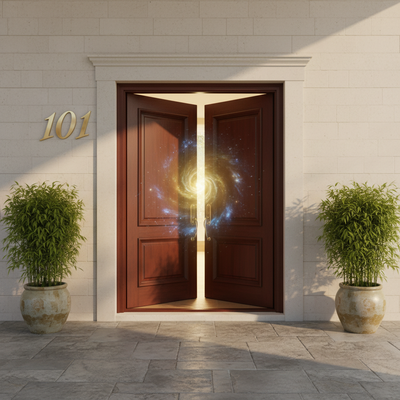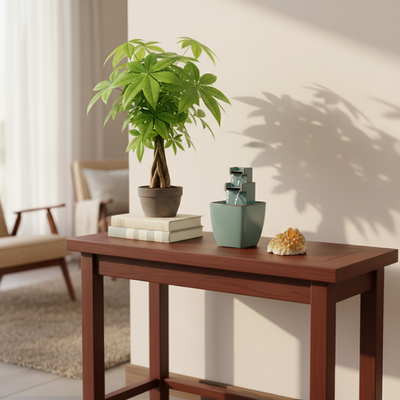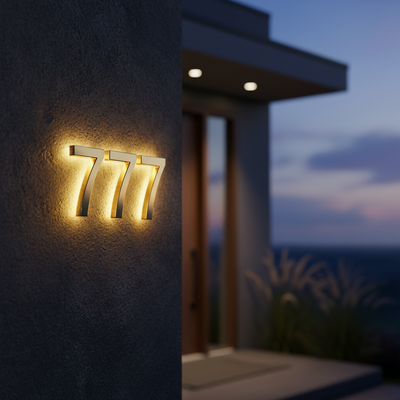The question comes up in almost every consultation: "Can I really not have a TV in my bedroom?" The conflict is familiar. You want a bedroom that feels like a peaceful sanctuary, a principle at the heart of feng shui. Yet, you also love the modern comfort of watching a movie from the coziness of your bed. So, is a TV in the bedroom always bad for feng shui?
The quick answer is no. It's not about completely banning it; it's about carefully managing its energy.
Traditional wisdom offers good warnings, but modern life requires practical solutions. In this guide, we won't just tell you "don't." We will explore why the warning exists, help you assess your own situation, and provide a complete toolkit of practical strategies. We will show you how to balance the presence of a television, ensuring your bedroom remains a haven for deep rest and meaningful connection, without giving up your tech.
The Core Conflict

To effectively manage the energy of a TV, we first need to understand why traditional feng shui advises against it. The concerns are not random; they are rooted in basic principles of energy, or Qi, that govern how we feel and interact within a space. The issues stem from three primary areas: energetic balance, symbolic reflection, and electronic disruption.
Yin-Yang: Active vs. Restful
Every space has an energetic signature. A bedroom, by its very nature, is a perfect Yin space. Yin energy is passive, dark, quiet, soft, and receptive. It's the energy of rest, sleep, intimacy, and renewal. It's where we go to recharge our personal batteries.
A television, on the other hand, is a strong source of Yang energy. Yang is active, bright, loud, fast-moving, and electronic. It represents the outside world, news, action, and stimulation. When you introduce this strong Yang element into a deeply Yin environment, you create an energetic clash. This conflict can show up as restlessness, difficulty falling or staying asleep, and a feeling that you can't fully "switch off." The active energy of the TV keeps your own energy field subtly stimulated, preventing the deep relaxation necessary for restorative sleep.
The 'Black Mirror' Effect
Perhaps the most cited feng shui concern is the TV screen itself. When turned off, a large, modern television becomes a dark, reflective surface—a "black mirror." In feng shui, mirrors are powerful activators. They double and bounce the energy of whatever they reflect.
When a TV screen reflects the bed, it is believed to energetically double the activity and occupants in that bed. Tradition holds that this can "invite" a third party into the relationship, symbolically creating an opening for infidelity or emotional problems between partners.
Beyond relationships, the mirror effect can impact your personal peace. If you go to bed feeling worried or stressed, the dark screen can reflect that anxious energy right back at you, amplifying it throughout the night and preventing your subconscious from truly settling. It creates an unsettling loop of energy in what should be your most peaceful space.
Qi Disruption and EMFs
From a classical feng shui perspective, the flow of natural, vital life force energy, or Qi, is extremely important for health and well-being. Modern electronics, including televisions, disrupt this subtle flow. They emit Electromagnetic Fields (EMFs), a constant, low-level electronic "buzz" that fills the space.
While the scientific community continues to study the long-term health effects of low-frequency EMFs, organizations like the World Health Organization have noted that exposure to EMFs from household appliances can potentially interfere with sleep patterns. From an energetic standpoint, this electronic static interferes with the smooth, gentle circulation of Qi in the room and within our own bodies, contributing to a sense of unease and broken rest.
To summarize the core issues:
* Energetic Imbalance: Active Yang TV energy disrupts the restful Yin nature of the bedroom.
* Reflective Surface: The screen acts as a mirror, potentially inviting relationship trouble and amplifying negative energy.
* Electronic Interference: EMFs disturb the natural flow of Qi, impacting sleep quality.
A Modern, Balanced Perspective
Understanding the traditional warnings is crucial, but it's not the end of the conversation. We live in a world where technology is deeply integrated into our lives. A rigid, strict approach that demands you sacrifice a cherished comfort often leads to frustration, not harmony. The modern practice of feng shui is about creating a supportive environment that works for your life, right now. This means shifting the focus from absolute rules to conscious management.
Intention and Habits Matter
The mere presence of a television is not as critical as the way you interact with it. Your intention and your habits hold immense energetic weight. Consider the big difference between these two scenarios:
One person mindlessly scrolls through channels, landing on a stressful news program, and eventually falls asleep with the TV blaring, their subconscious mind absorbing chaos and anxiety all night.
A couple, on the other hand, consciously decides to watch a beautiful nature documentary together. They dim the lights, get comfortable, and share a quiet, relaxing experience before turning the TV completely off an hour before sleep.
In the first case, the TV is a source of disruptive, negative energy. In the second, it becomes a tool for winding down and connecting. The object is the same; the intention and the resulting energy are worlds apart.
A Tool for Connection?
But what if watching a movie together in bed is your favorite way to unwind as a couple? For many, this shared ritual is a form of intimacy and connection. It's a way to decompress from a busy day, side-by-side, sharing an experience. To label this as "bad" feng shui would be to ignore the positive, bonding energy it creates.
The key is balance. If watching TV together is a cherished ritual, it can absolutely strengthen a bond. The goal is to ensure this activity is a conscious choice for connection, not a mindless distraction that replaces conversation and other forms of intimacy. It should be one of many ways you connect, not the only way.
Harmonize, Don't Demonize
This brings us to our core philosophy: with the right strategies, you can neutralize the negative effects of a bedroom TV and enjoy its benefits. The goal is to control the TV's energy, not let it control your space. You don't have to choose between ancient wisdom and modern comfort. You can, and should, have both. The following toolkit provides the practical methods to do just that, transforming your TV from a potential problem into a well-managed part of your personal sanctuary.
The Ultimate Toolkit
Here are five practical, tiered solutions to effectively manage the tv in bedroom feng shui. You can choose the one that best fits your budget, style, and commitment level, or combine several for a multi-layered approach.
Solution 1: The Cover-Up
This is the simplest and most accessible solution. When the television is not in use, cover the screen.
- How: Use a beautiful piece of fabric, like a custom-made TV cover, a soft velvet throw, or a piece of natural linen. Simply drape it over the screen.
- Why it Works: This immediately negates the "black mirror" effect. By covering the reflective surface, you stop it from bouncing energy around the room. The soft fabric also visually softens the hard, electronic presence of the device, helping it blend into the room's restful Yin decor.
- Pro Tip: Choose a textile that complements your bedroom's color palette and texture. Think of it as another decorative element, not just a practical cover.
Solution 2: Concealing Furniture
A more integrated and highly effective solution is to place the TV inside a piece of furniture that can be closed.
- How: Options range from a traditional armoire or a dedicated media cabinet with doors to custom-built cabinetry. For a high-tech solution, a TV lift cabinet mechanically lowers the TV into the unit when not in use.
- Why it Works: This method is the embodiment of "out of sight, out of mind." When the doors are closed, the TV's energy is completely contained. It is no longer a visual or energetic presence in the room, allowing the space to fully return to its restful Yin state.
Solution 3: Projectors
For those building, renovating, or willing to invest in the ultimate modern solution, a projector and retractable screen is the best choice from a feng shui perspective.
- How: A small projector is mounted discreetly on the ceiling or a shelf, and it projects onto a screen that automatically retracts into the ceiling or a slim casing when not in use.
- Why it Works: This completely eliminates the problem. There is no physical TV set, no "black mirror," and no electronic presence when the system is off. The wall remains a neutral, solid surface, preserving the pristine energetic integrity of the room without sacrificing a large-screen viewing experience.
To help you decide, here is a comparison of these three primary solutions:
| Solution | Effectiveness | Pros | Cons | Estimated Cost/Effort |
|---|---|---|---|---|
| Fabric Cover | Good | Low cost, easy to implement, adds a decorative touch. | Requires a daily habit to cover/uncover; can look untidy if not done well. | $ / Low |
| Concealing Furniture | Better | Highly effective energy containment, often adds valuable storage. | Can be expensive, takes up significant floor space. | $$ / Medium |
| Projector & Screen | Best | Completely neutralizes the issue, clean and modern aesthetic. | Highest initial cost, requires professional installation. | $$$ / High |
Solution 4: Strategic Placement
If you cannot conceal the TV, where you place it becomes even more important. The general rule is to avoid placing the TV directly opposite the foot of the bed. This is the most energetically aggressive position.
For a more advanced approach, we can use the Bagua Map, a feng shui energy grid. Imagine laying a 3x3 grid over your bedroom floor plan, with the bottom of the grid aligned with the wall containing the door. Each of the nine sections corresponds to an area of life. Ideally, you want to avoid placing the TV in the "Love & Marriage" corner (the far-right corner from the door). A better, though still not perfect, location would be in the "Knowledge & Self-Cultivation" area (near left) or the "Career" area (front center).
Solution 5: Energy Clearing
Finally, regardless of which physical solution you choose, practicing good energy hygiene is essential.
- Place EMF-Absorbing Crystals: Place a piece of Black Tourmaline, Shungite, or Smoky Quartz near the television. These stones are believed to help absorb and neutralize electromagnetic frequencies, cleaning the energetic air.
- Unplug Completely: Standby mode still draws power and emits a low-level EMF buzz. When you are finished watching for the night, unplug the TV from the wall socket or use a power strip that you can switch off.

- Create a Tech-Free Buffer: The most powerful ritual is to establish a "no-tech" period before sleep. Turn off the TV, phone, and all screens at least one hour before you intend to sleep. This allows your brain and your personal energy field to wind down naturally.
A Case Study in Qi Harmony
Theory is important, but seeing how these principles transform a real space is where the magic becomes tangible. We want to share a story from our practice that illustrates the power of a holistic approach to the tv in bedroom feng shui.
The Client's Challenge
We were contacted by a couple, "Sarah and Tom," who felt their home was working against them. Their primary complaint was their master bedroom. Both were successful professionals who led busy lives, and they had come to dread entering their bedroom. Sarah reported restless nights and waking up tired, while Tom felt a subtle but persistent anxiety in the space. They also shared that they felt a growing distance between them, with evenings often ending in them silently watching their large, wall-mounted TV. The TV was positioned directly opposite the foot of their bed—a classic feng shui misstep.
Our Holistic Assessment
During our consultation, the QI FLOW team immediately noted the overwhelming Yang energy in the room. The TV was the dominant feature, its large black screen creating a powerful "mirror" that reflected the bed. We explained to Sarah and Tom how this setup was likely a major contributor to their issues. The active energy was disrupting their ability to rest, while the mirror effect was symbolically amplifying the day's stress and potentially creating an energetic "third presence" that contributed to their feeling of disconnection. The Qi in the room felt stagnant and heavy.
The Implemented Solution
Our goal was to restore the bedroom to its rightful status as a Yin sanctuary without demanding they give up their movie nights. The QI FLOW team proposed a multi-layered strategy:
- Step 1 - Concealment: The couple loved their TV's size and didn't want to downsize. Instead of removing it, we sourced a beautiful, slim-profile media cabinet with bifold doors that matched their existing decor. A carpenter retrofitted it to the wall, allowing the TV to be completely hidden when not in use. The simple act of closing the doors became a powerful ritual.
- Step 2 - Habit Change: We worked with them to create a new evening routine. They committed to a "no-tech hour" before sleep. After their show, they would close the cabinet doors, light a candle or turn on a salt lamp, and spend time reading or talking.
- Step 3 - Energetic Support: To counter the residual electronic energy and actively foster connection, we placed a piece of black tourmaline inside the cabinet. On Sarah's bedside table, we placed a small bowl of rose quartz crystals, the stone of unconditional love, to soften the room's energy and encourage intimacy.
The Result: Restored Peace
The transformation was profound. Within two weeks, Sarah reported sleeping through the night for the first time in months. Tom felt the "anxious hum" in the room was gone. They shared that closing the cabinet doors felt like "closing the door on the day's stress," and their new tech-free ritual had brought back the easy conversation they had been missing. Their bedroom once again felt like their private, romantic, and restful sanctuary, proving that a TV in the bedroom can be harmonized with stunning results.
Elevating Your Bedroom's Feng Shui
Managing your TV is a huge step, but it's just one piece of the puzzle. To create a truly harmonious sanctuary, consider the entire energetic ecosystem of your room. Here are a few foundational principles to elevate your bedroom's overall feng shui.
The Command Position
This is the most important principle of bed placement. You should be able to see the door to your bedroom from your bed, but you should not be directly in line with it. This position gives you a subconscious sense of security and control.
* Do: Place the bed against a solid wall, diagonally opposite the door.
* Don't: Place the bed directly under a window, sharing a wall with a toilet, or with your feet pointing directly out the door (known as the "coffin position").
Declutter for Clarity
Clutter is the physical manifestation of stuck energy. It creates stagnant Qi, which can lead to a feeling of being stuck in life. A cluttered bedroom leads to a cluttered mind and restless sleep.
* Clear everything from under your bed. This area should be open to allow for healthy Qi flow while you sleep.
* Keep surfaces clear. A tidy bedside table promotes a calm mind.
* Be ruthless with anything that doesn't belong in a sanctuary: exercise equipment, work papers, and piles of laundry all bring stressful, active energy into the room.
Soothing Colors and Materials
Your bedroom should appeal to the senses in a soft, gentle way. This is primarily achieved through color and texture.
* Colors: The best palettes are based on "skin tones," which range from soft off-whites and pale pinks to rich cocoa and chocolate browns. Soft, muted greens and blues, which evoke nature, are also excellent for promoting tranquility.
* Materials: Choose natural, breathable fabrics for your bedding, curtains, and rugs. Materials like organic cotton, linen, silk, and wool have a much better energetic feel than synthetic materials like polyester.
Balancing the Five Elements
A harmonious room contains a subtle balance of all five feng shui elements. You don't need to be obvious about it; a gentle nod to each is enough.
* Wood: Represents growth and vitality. A small, healthy plant (like a snake plant, which purifies the air) or a wooden headboard can bring in this element.
* Fire: Represents passion and energy. Use this element sparingly. Soft lighting from a dimmer switch or a candle (used safely before sleep) is sufficient.
* Earth: Represents stability and nourishment. This can be incorporated through earthenware, crystals, square shapes, and earthy colors like sand, terracotta, and ochre.
* Metal: Represents clarity and precision. Use in small doses, such as with a minimal metal picture frame or small decorative objects.
* Water: Represents emotion and flow. A mirror (not reflecting the bed) or a piece of art depicting a calm water scene can represent this. Avoid actual water features like fountains in the bedroom.
Conclusion: Create Your Sanctuary
The dilemma of tv in bedroom feng shui is not an unsolvable problem requiring you to sacrifice modern comforts for ancient principles. As we've seen, it is entirely a matter of conscious choices and smart, intentional management.
The path to harmony is clear. By implementing powerful solutions like concealing or covering the screen when it's not in use, you neutralize its most disruptive qualities. By being mindful of your viewing habits and creating a sacred, tech-free buffer zone before sleep, you reclaim control over your environment's energy.
Your bedroom should be your ultimate sanctuary for rest, rejuvenation, and connection. It is the most personal room in your home and should reflect and support your well-being above all else. By applying these practical principles, you can create a space that perfectly balances the convenience of modern living with the timeless wisdom of feng shui, fostering deep rest, love, and a profound sense of peace.







